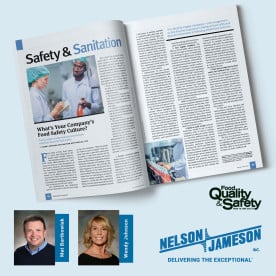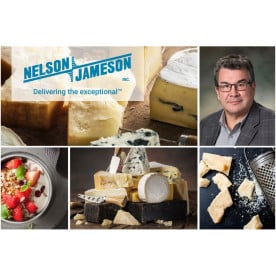From August through October, “The Wide Line” blog will feature a series of columns authored by Dan Strongin, a well-known name in the food industry.
Snippets from a conversation with John Nelson, CEO and Jerry Lippert, President of Nelson-Jameson, Inc.
I sat down with John and Jerry for a chat recently, by way of Skype, in order to help understand the view from the top.
John –I'll offer an historical perspective. In 1947 when we began, our original business model was a general store for cheese manufacturers. This was the perception of a guy named Jameson, who left the company within a couple of years. He had been a salesman for a long time in the cheese industry, selling equipment, and peering over the fence. He thought that a one-stop shop, or a general store seemed like a good idea, and the model has worked very well. One of the best rationales I think, even today, was/is the impact on freight cost. Often when companies look at their cost of merchandise and material, they don't add in freight cost; they put it in a separate column.
Bundle these all together in every department and you can avoid separate UPS charges that can just eat you up. If you look at the percentage of cost on the UPS rate for an item, and unless it's a hunk of gold or something that has incredible value, it's just not worth it.
Another thing to consider comes in all the different transaction costs you incur with a whole lot of different companies. The fact is, when you're placing numerous purchase orders, getting online with a whole lot of different companies, placing a lot of phone calls and cutting a lot of checks to different people, there is a price. Just maintaining that number of contacts is somewhat difficult.
Fortunately for us, many of our customers recognize the wisdom of our approach, and they're trying to cut down their suppliers, a lot. When they cut down the number of suppliers, they are looking for someone who can provide them with a lot of what they buy. Now, we don't have everything, but for most of our customers, they find they don't have to maintain a lot of other relationships once they start taking full advantage of everything we offer.
Jerry: I would echo a lot of what John has said. Conceptually, it is total procurement cost. It really, truly is! The total procurement cost is a topic customers understand. Previously we would have customers tell us, you guys are at $9.95; I can get it for $9.90. I would respond, "Yes, but you have to drive down to Fleet Farm, you have your extra invoice, and you have the extra check, and how long does that take you? Isn’t your time worth something?
The whole procurement cost is higher. Even when you look at individual items, we are competitive. In general, we are the low-cost provider in terms of 10 to 15% of our items, and in 70% to 75% of our items we are extremely competitive, and there is maybe 10% on specials and such, where we might be a few cents more. Overall, the total procurement cost through Nelson-Jameson, is a huge advantage to our customers.
There is one final thing I would like to say. When I joined Nelson-Jameson I had been in distribution, and I thought I understood distribution, but the focus on the customer at Nelson-Jameson, vs. the product, was something that was really critical in changing my worldview. I came from a paper distribution background where the focus was on the product. The customer focus of Nelson-Jameson is in bringing expertise: inside experts who can talk to a customer and tell them how to use these products. Nelson-Jameson even has a food scientist on staff.
Final Note: Why one-stop shopping? Because it saves money, the real kind, the stuff that ends up in the bank! In the next segment we will look at the evolution of the catalog as a primary tool for listening to AND responding to customers just like you.







